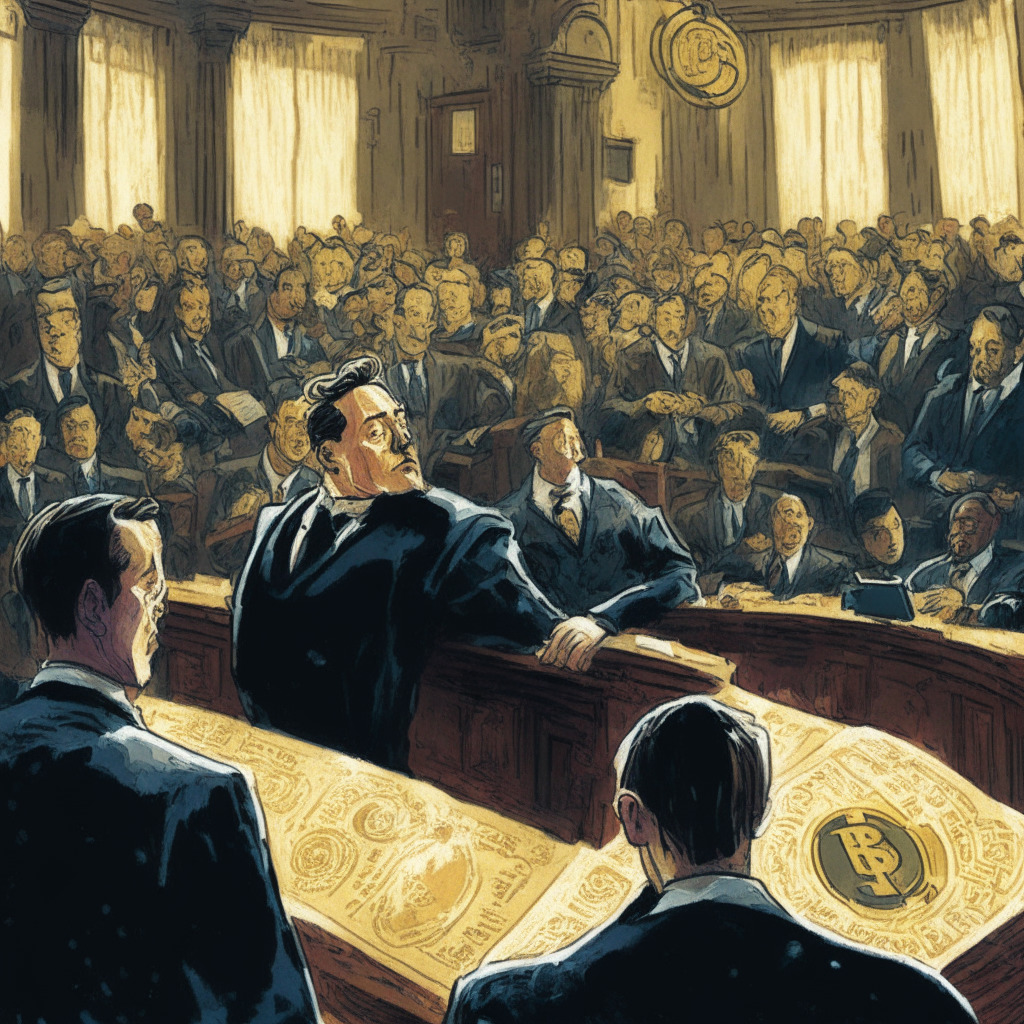“The realm of cryptocurrencies is in troubled waters with ongoing legal proceedings by the CFTC against four individuals from Fundsz for fraudulent activity. However, while these proceedings could mark a significant stride in cryptocurrency regulation, they may create a hostile environment for legitimate businesses, thus potentially hindering the acceptance and growth of the crypto world.”
Search Results for: Legitimate
Lil Tay: Caught in the Crossfire between Social Media Stardom and Crypto Currencies
Internet influencer Lil Tay’s rise to fame coincides with the unauthorized launch of a cryptocurrency bearing her name. Amid rumors surrounding her disappearance, her manager Harry Tsang introduces an Ethereum-based “Liltay Token.” The situation underscores the trend of tokens inspired by real-world events and celebrities, and the risk of counterfeit versions and scams in the crypto marketplace.
PayPal’s New Stablecoin vs DEX-Launched Meme Coins: A Tale of Crypto Hype and Caution
“The recent announcement by PayPal about its new stablecoin brought skepticism due to the controversial freeze function in the contract. Amidst this, PYUSDF and Wall Street Memes emerged, representing divergent prospects in the digital currency market. Remain cautious, digital currencies are high-risk assets.”
Unveiling Apple’s New Gen AI: Bridging Innovation, Security and Ethics in the Tech World
“Apple is developing an in-house AI tool, aiming to enhance user experiences through AI integration in their forthcoming iOS17. However, this raises concerns over data security, prompting debate on whether AI should operate locally or on cloud. This has fueled greater focus on AI for mobile devices.”
Unfurling the Future of Finances: Russia’s Digital Ruble Takes the First Leap
Russia is set to launch a pilot program for its digital ruble with 600 participants and 30 retailers. This Central Bank Digital Currency (CBDC) initiative follows China’s digital yuan strategy and could see the digital ruble in active use by 2025, transforming the country’s financial landscape. The token has potential for making and receiving cross-border payments.
Unwrapping BTC20: Bitcoin’s Enhanced Version Stepping onto the Crypto Scene
Bitcoin’s Ethereum-based alternative, BTC20, is creating buzz in the market. Noted for strong performance during its presale, it offers practical staking opportunities providing potential APY returns of up to 520%. Adopting Ethereum blockchain makes it energy efficient and suitable for Decentralized Finance.
Balancing Public Interest and Fair Trials in Crypto’s Emerging Legal Landscape
“The NY Times defends its First Amendment rights in the criminal case against former FTX CEO, Sam Bankman-Fried. This raises questions about the balance between public interest and the sanctity of an ongoing trial, with implications for understanding the vulnerabilities and regulatory blind spots in the sphere of cryptocurrencies and blockchain-based financial operations.”
Crypto Exchange Courtroom Drama: Sam Bankman-Fried’s Legal Conundrum & FTX’s Restructuring Woes
Sam Bankman-Fried’s lawyers are defending against witness tampering allegations related to a legal battle, arguing that his actions were misinterpreted as intimidation. Meanwhile, FTX crypto exchange faces criticism from the UCC over its post-bankruptcy restructuring plans, pointing to a lack of consultation, late planning, and the need for a crypto-experienced individual for oversight if it relaunches as an offshore exchange.
Bankruptcy and Blockchain: FTX Vs Genesis Case Study & Its Impact on Crypto Regulation
The recent bankruptcy settlement between FTX exchange and Genesis crypto lender has sparked numerous conversations about the financial implications of blockchain technology and its regulations. This case highlights the need for a stronger, transparent regulatory framework for cryptocurrencies to ensure fair play whilst encouraging innovation.
Unveiling the Vulnerability of Crypto Sphere: The Jeremy Hogan XRP Scam Incident
The scam involving renowned lawyer Jeremy Hogan underlines digital security’s critical nature in the blockchain realm. The incident saw invasive hackers misuse Hogan’s Twitter handle for a fake XRP giveaway, accumulating funds from unsuspecting users. This occurrence highlights the crypto sphere’s vulnerability, emphasizing that the spread of manipulated, deceptive financial information from influential figures poses significant risks for investors and the blockchain market.
Navigating the Crypto Future: Canada’s Approach to Regulating Blockchain and Crypto Assets
“Canadian financial regulators have proposed capital plans for banks and insurers dealing with crypto assets, inspired by the Basel Committee’s suggestions. This could foster a more harmonious relationship between traditional finance and blockchain innovations, while maintaining financial stability and recognizing cryptocurrencies as legitimate financial assets.”
Navigating the Meme Coin Universe: Prospects, Pitfalls and Due Diligence in Cryptocurrency Investment
“The wider cryptocurrency market remains relatively flat, with Bitcoin and Ethereum holding steady. Investors are exploring the meme coin market space, filled with potential yet risk. New coins with potential substantial gains sometimes lack substantial utility or project vision. Presale projects often provide stability with near-term profit potential, such as BTC20. Crypto investments are high-risk, and the potential for loss is significant. Exploration and patience are key.”
South Park-Themed Burn Kenny Coin: A Meme Coin with Explosive Potential?
“Burn Kenny Coin, a new South Park-themed project, is causing excitement among meme coin enthusiasts with its presale of $KENNY tokens. Garnering $400,000 within 24 hours, this low cap gem hints at explosive growth potential, leveraging scarcity and an inbuilt burn mechanism.”
Cryptocurrency Wealth: A Magnet for Modern Home Invasions
“In Richmond, high-value cryptocurrency investors face increased home invasion risks, with criminals posing as delivery drivers to gain access. This shift highlights vulnerabilities beyond digital or market-driven risks. The decentralized nature of cryptocurrencies simultaneously brings freedom, potential financial returns, and personal safety threats, marking a critical evolution in the blockchain future.”
Crypto Pioneer Treads Volatile Waters: The Journey of KIN and the Birth of Code Wallet
The minimalist crypto wallet Code, backed by the former CEO of Kik, has launched its Solana-based application focusing on the KIN cryptocurrency. Despite regulatory challenges, Code’s founder believes it offers potential for adoption due to its clearance for U.S trading. Confidently advocating for ‘digital paper cash’, it also allows transactions during network outages. However, its success relies heavily on KIN’s acceptance as a legitimate payment method, a venture that comes with risks due to price volatility.
EU’s New Data Act: Justifiable Concern for Blockchain Sphere or Unfounded Fear?
The EU’s new Data Act draft has stirred up concerns in the blockchain sector, as it appears to ignore industry-specific issues and could potentially deem most smart contracts invalid. The legislation emphasizes on the “vendors” of these automated programs, causing fear among lobbyists as it could imply endless accountability in decentralized frameworks with no single seller.
Bridging the Gap: Roc Nation, Puma & Blockchain in the Sneaker World – Opportunity or Gimmick?
“Roc Nation, Puma, and blockchain startup Legitimate have unveiled a sneaker collection embedded with blockchain-backed non-fungible tokens (NFTs). These NFC embedded sneakers tie physical and digital realms, offering an authentication method and exclusive digital content.”
The SEC at the Crossroads of Crypto Regulation: The Ripple Case and its Implications
The US Securities and Exchange Commission (SEC) struggles with defining what deems a security in the cryptocurrency world. A recent ruling in SEC vs. Ripple differentiates the sale of XRP tokens from Ripple’s entrepreneurial efforts, challenging the SEC’s traditional norms.
The Phygital Revolution: Bridging the Gap Between Fashion, Music, and Blockchain Technology
“Blockchain and digital assets company, Legitimate, has partnered with PUMA and Roc Nation to develop an exclusive sneaker collection that merges music, fashion, and blockchain technology. Their ‘phygital’ approach also incorporates NFC chips to deliver unique content and foster strong bonds between brands and customers.”
Blockchain Revolution in Sports: The Rise of Interactive NFTs and New Digital Engagement Tactics
“Interactive Non-Fungible Tokens (NFTs) are changing the game for sports memorabilia, with digital-first approach providing accessibility to fans worldwide. Partnerships between sports icons, digital artists and sports organizations give birth to unique blends of sports data and digital art, while still questioning how to effectively display digital art.”
Ransom Attacks: A Rising Threat Amidst Reducing Crypto Scams – An In-Depth Analysis
A substantial 77% decline in crypto scams is offset by a worrying rise in ransom attacks, seeing a 62.4% increase in perpetrator revenue. Large organizations are increasingly targeted for maximum extraction. Despite falling scam revenues reflecting heightened awareness, the future of blockchain security deals with challenges from sophisticated ransom attacks.
Crypto Crime Shifts: A Decline in Scams but a Rise in Ransomware Attacks
“Cryptocurrency criminals are seeing decreased earnings due to a fall in scams and hacking, reporting a deficit of around $2.5 billion, a 65% decline compared to 2022. However, ransomware attackers continue to extort money, amassing nearly $450 million this year alone. The landscape presents a mixed scenario for crypto enthusiasts, with fewer scams but continued illicit activities.”
Crypto Taxation in Russia: A Paradox Amidst Legal Ambiguity and Regulatory Deadlocks
Russia’s Federal Tax Service (FTS) recently affirmed that citizens can pay taxes on crypto earnings in spite of the ambiguous legal status of cryptocurrency. Two tax methodologies are proposed: personal income tax disclosures or the condensed taxation system. This starkly contrasts with the Central Bank’s anti-crypto position, hinting at a deeper inconsistency in governmental approaches to digital financial technology in Russia.
Unmasking the Gutsy NFT Heists: How Safe is Your Digital Art Collection Really?
The crypto world recently witnessed a major hack, targeting the Ethereum-based NFT collection, Gutter Cat Gang, resulting in a loss range of $750K-$900K. This sophisticated attack stole 87 NFTs from 16 individuals, leveraging the Gutter Cat Gang’s Twitter for a fake public airdrop. The incident highlights the critical need for extensive security measures to protect crypto assets and platforms.
Explosion of Controversy: Brazilian Authorities Auction Off Seized Assets from Crypto-Scheme
Brazilian authorities plan to auction assets seized from Trust Investing, which is under suspicion for links to a potential crypto-based financial pyramid scheme. The assets, totaling roughly $288,000, includes luxury vehicles and nearly $250,000 in cryptocurrencies. This move underlines the need for stricter regulation and investor risk mitigation in the crypto industry.
Navigating the MiCA Legislation: Impacts on Private Stablecoins and the Future of Crypto Regulation
The European Union enacted the Markets in Crypto-Assets (MiCA) legislation, sparking controversy with a daily 200 million euros transaction cap for private stablecoins. This is meant to protect investors from large-scale stablecoin failures which could impact traditional financial systems. However, critics argue it could stifle innovation within the crypto landscape.
Decoding DeeLance: Disrupting Recruitment with Blockchain & NFTs – A Gamble Worth Taking?
“DeeLance, a crypto project that achieved $1.5 million in presale, aims at reinventing the recruitment space using blockchain, non-fungible token (NFT), and metaverse technologies. Although this groundbreaking approach presents a potential seismic shift, critics question whether it can efficiently and securely disrupt a saturated industry.”
Crypto Exchange Scams: The Threat of Phishing Attacks Using Coinbase’s Domain Name
Users of the crypto exchange, Coinbase, have been targeted by sophisticated phishing attacks. Scammers, misusing the exchange’s domain name, contact victims pretending to be Coinbase support, leading to compromised accounts and personal data. This raises concerns about the robustness of current countermeasures.
Breaking Down The AI Training Ethical Dilemma: Copyright Claims Against Meta Platforms and OpenAI
Authors Sarah Silverman, Richard Kadrey, and Christopher Golden accuse Meta Platforms and OpenAI of copyright infringement, claiming that their copyrighted content was used without permission for AI training. The lawsuit highlights the ethical boundaries around incorporating copyrighted material into AI technology development and could have significant implications for the blockchain and AI industry.
Musk Challenges Alleged Conflict in $258B Dogecoin Lawsuit Amid BIS CBDC Cybersecurity Efforts
“Elon Musk and Tesla face a $258 billion lawsuit over alleged misconduct related to Dogecoin cryptocurrency. Meanwhile, the Bank for International Settlements is developing a framework to protect Central Bank Digital Currencies from cyber threats, underlining the tension and commitment within the crypto and traditional financial ecosystems to the blockchain future.”
Swift Singing the Crypto Blues: Pop Star’s Promised Sponsorship with FTX Collapses
“Taylor Swift controversially inked a $100 million sponsorship agreement with now insolvent crypto trading platform, FTX, despite her detailed investigation on the platform’s credibility. The sudden withdrawal of the deal by FTX led to disappointment for Swift’s team and underlines the unpredictability of the cryptocurrency world.”
Dissecting the BlockFi-FTX Legal Drama: Decoding Regulatory Challenges in Crypto Space
The legal conflict between BlockFi and FTX emphasizes the complexity of financial transactions in the crypto world, with over a billion dollars in dispute. Both cases highlight the emerging regulatory challenges, as well as the necessity for comprehensive control mechanisms to maintain faith in the crypto market’s health and safety.































